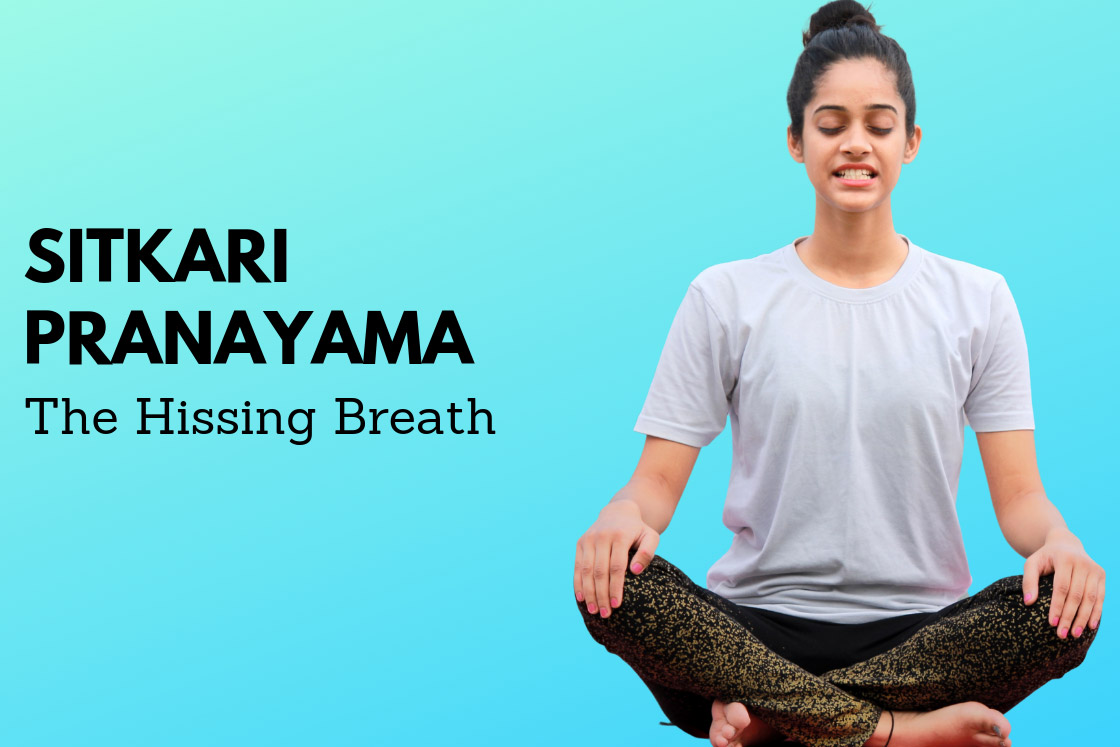
Sitkari Pranayama is a cooling breathing technique well-known for its ability to lower body temperature and calm the mind. This pranayama is especially beneficial in hot climates and stressful situations, where managing internal heat and tension is crucial.
Rooted in the ancient traditions of Hatha Yoga, a classical system emphasizing physical postures and breath control, Sitkari Pranayama has been practiced for centuries. Revered texts like the Hatha Yoga Pradipika highlight it as a powerful tool for balancing inner energies and achieving a tranquil state of mind.
This age-old practice continues to be highly valued for its ability to harmonize the body and mind, making it an essential component of modern yoga practices.
Also Read: Another Cooling Breath Using Rolled Tongue
Meaning of sitkari
The term “Sitkari” is used in the Sanskrit language for ‘Hissing‘ sound. In sitakari pranayama, when air is sucking in through gap present in the teeth, a ‘hiss’ sound is produced. The produced hissing sound is the same as snakes make when they release their stress and frustration.
Hence, sitakari pranayama also called hissing breath which let Prana or ‘life force’ to cool down & thus release excessive anger and frustration out of the body.
To practice sitkari pranayama, sit comfortably on the floor in any meditative pose with head, neck, and back aligned. Gently press your upper and lower teeth together and start inhaling through teeth gaps and exhaling through the nose.
How to do sitkari pranayama(steps)
- Sit comfortably in a cross-legged pose and align your back body in one line. To deepen the breathing effect, you can close your eyes and emulate Gyan Mudra with your hands.
- Now, gently press your upper and lower teeth together, and separate your lips comfortably so that your teeth get exposed to the air.
- Curl your tongue upwards so that lower part of tongue touches the upper palate. (If you aren’t able to curl your tongue, just rest your tongue at the back of the teeth)
- Now breathe-in slowly & deeply through the gaps present in the teeth. Feel the air is filling up your abdomen, followed by chest & neck portion in the end. During your breath inhalation, a small hissing sound will be made.
- Now close your lips (eventually mouth) and exhale through your nose slowly in a controlled way.
- This completes 1 round of Satakari Pranayama.
Additional tips
- For beginners, maintain an inhalation-to-exhalation ratio of 1:1. As you become more comfortable, you can gradually extend the exhalation to 2 or 4 times the duration of the inhalation.
- Advanced practitioners may incorporate breath retention (Kumbhaka) and bandhas. After inhaling, hold the breath and lower your chin to your chest (Jalandhar Bandha), then exhale slowly.
Precautions
- Avoid in cold weather or if you are feeling cold.
- Perform Sitkari Pranayama on an empty stomach or a few hours after a meal.
- Ensure your body temperature and surrounding temperature aren’t vastly different, as inhaling very cold air may affect your lungs.
- Avoid prolonged breath retention during Sitkari Pranayama, as it can reduce the cooling effect.
- Do not practice Sitkari Pranayama when the surrounding air is highly polluted.
Contraindications
- Not recommended for those with respiratory issues like asthma or bronchitis.
- Should be avoided if you have low blood pressure (hypotension).
- Not suitable for individuals suffering from colds, flu, or nasal congestion.
- Those who have sensitive teeth or gap in teeth should avoid it, as it can raise sensation in the tooth.
- Pregnant women should avoid practicing without consulting a healthcare professional.
- People with chronic digestive issues should refrain from practicing this pranayama.
- Sitkari pranayama is a good alternative for those who can’t roll tongue in sitali pranayama.
Benefits of sitkari pranayama
Sitkari Pranayama is a highly effective cooling breathing technique that offers a range of benefits for both body and mind. By lowering body temperature and promoting relaxation, it effectively reduces stress, anxiety, and the discomfort associated with overheating. This practice not only improves digestion and mental clarity but also helps regulate internal heat, balance the pitta dosha, and manage hyperacidity
- Reduces Body Temperature: Sitkari Pranayama has a cooling effect that helps lower body temperature. This is particularly useful in hot climates or during periods of heat, helping to prevent overheating and maintain comfort.
- Relieves Stress and Anxiety: The practice induces relaxation by calming the nervous system and reducing stress levels. The focused breathing and cooling effect can help alleviate anxiety and promote a sense of calm.
- Enhances Digestion: By stimulating the digestive system, Sitkari Pranayama can improve digestive functions and alleviate symptoms of hyperacidity. This helps in better nutrient absorption and overall digestive health.
- Balances Body Heat: The pranayama helps regulate internal body heat by influencing the brain areas that control temperature. This balance is essential for maintaining homeostasis and preventing conditions related to excessive body heat.
- Balances Pitta Dosha: In Ayurvedic terms, Sitkari Pranayama helps balance the pitta dosha, which is associated with heat and inflammation in the body. This balance can reduce overall soreness and inflammation.
- Improves Skin Health: The cooling effect of Sitkari Pranayama can be beneficial for inflammatory skin conditions, helping to soothe and reduce skin inflammation.
- Promotes Mental Clarity: The cooling and calming effects of Sitkari Pranayama support mental clarity and focus. This can improve concentration and cognitive function, aiding in better decision-making and mental performance.
Conclusion
In summary, Sitkari Pranayama is a powerful cooling breathing technique deeply rooted in Hatha Yoga. It effectively regulates body temperature and calms the mind, making it particularly beneficial for managing stress and physical heat. When incorporated into modern yoga practices, Sitkari Pranayama enhances digestion, mental clarity, and overall balance. This ancient technique bridges traditional wisdom with contemporary wellness needs, providing significant support for both physical health and emotional well-being.




